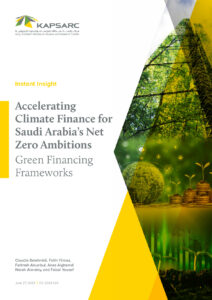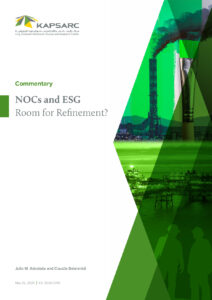Claudia Belahmidi is a Senior Fellow in the Oil and Gas program, with a focus on the impact of ESG topics and Climate Finance on the hydrocarbon industry. Claudia has more than 13 years of research and industry experience analyzing energy markets, policies, and companies. Before joining KAPSARC, Claudia worked at S&P Global as an Equity and Strategy Analyst in the Commodity Insights Team, providing flagship and bespoke insights and analysis on a number of integrated oil companies as well as European independent producers. Previously, Claudia spent three years as an energy research analyst (Northern Europe and North America) with IHS. She holds a B.A. in Political Science and an M.A. in International Affairs from the Fletcher School, Tufts University.

Accelerating Climate Finance for Saudi Arabia’s Net Zero Ambitions: Green Financing Frameworks
As part of the global climate agenda, the Kingdom of Saudi Arabia (KSA) is committed to achieving net zero greenhouse gas (GHG) emissions by 2060 through the Circular Carbon Economy (CEE) approach. To achieve this goal, the Kingdom aims to involve private investors more and advance its financial sector, fostering economic diversification and growth in line with Vision 2030 (Saudi Vision 2030 2018). The Kingdom has already announced several giant projects involving various clean technologies, including renewable energy, energy efficiency, clean hydrogen, natural capital development, and carbon management technologies, which amount to hundreds of billions of dollars in investment.
27th June 2024
